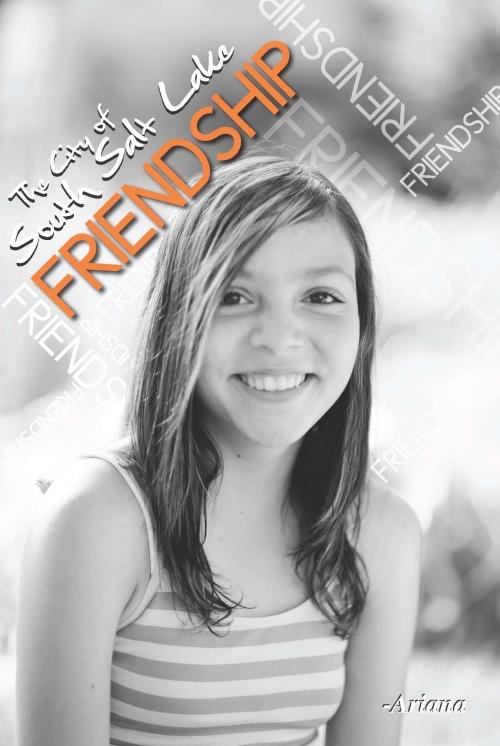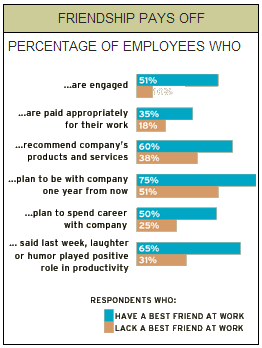April 2013 – Friendship

Ariana attends the Leadership and Resiliency Program (LRP) and shows great dedication to the program. She always has an upbeat positive attitude followed by a great smile. She is a team player and is always willing to help others. She is a wonderful help with her sisters and her mom; it’s very obvious they share a great bond. On a recent canoeing activity she had that contagious smile on her face! She had never been canoeing before but was the first one to jump in the lake from the canoe and the last one to get back in!
Friendship
Definition
Treating someone with respect and loyalty
What is a good friend? Someone you care for and trust. Someone you can talk to and laugh with, and someone who is by your side in good times and bad times
Quotes
“A friend should be one in whose understanding and virtue we can equally confide, and whose opinion we can value at once for its justness and its sincerity.” -Robert Hall
“A true friend never gets in your way unless you happen to be going down.” -Arnold H. Glasow
“One of the most beautiful qualities of true friendship is to understand and to be understood.”
~Lucius Annaeus Seneca
“Friends show their love in times of trouble, not in happiness.” ~Euripides
“There is nothing on this earth more to be prized than true friendship.” ~Thomas Aquinas
Friendship
Aside from family, there’s nothing more important to kids than their friends. Through friendships, children learn who they are, what makes them happy, and how to negotiate and navigate life.
Making friends (and keeping them) is one of the most important skills kids learn, and building healthy relationships is a hands-on activity. The best lessons on friendship begin and end at home.
Here are some ways parents can teach kids to make friends:
* Be a good friend. Set a healthy example for kids to follow. A child’s earliest experience learning any new skill comes from modeling parents. Kids watch how parents interact with each other, their children, extended family and their own friends. Examine your relationships. Are you loyal? Are you reliable? Are you manipulative, selfish, or controlling? Remember, your kids are watching.
* Teach balance. Kids struggle with balance in all parts of life. They exaggerate and over-compensate because boundary-setting and self-discipline are new skills. Teach kids to engage moderately with friends. Are you clingy or standoffish? Are you a pushover or a bulldozer? Do you always lead or follow? Any of these extremes will be harmful to cultivating relationships. Even positive friendship activities—sharing, playing, communicating, and gift giving—can be lopsided. If one kid’s always giving while the other takes, it’s not a healthy friendship.
* Prioritize friendships appropriately. If you make your friendships more important than your family, your kids learn skewed priorities. Use time as a gauge—how much time do you spend interacting with friends (including cellphone, Facebook and social networking) compared to time with family? Teach kids to keep friendships in perspective.
* Let friendships happen organically. Neither parents nor any adult should push kids to befriend other kids. Adult engineering of friendships has the opposite effect—it drives kids apart. It makes kids question themselves and distrust their own judgment. Children know whom they feel comfortable with and with whom they don’t. Friendships, like flowers should be left to form naturally.
Making friends is a skill best learned by practice and good example.
Gideon & Otto by Olivier Dunrea
Big Dog…Little Dog by P.D. Eastman
Chester’s Way by Kevin Henkes
Pirates and Princesses by Jill Kargman
Ladybug Girl and The Bug Squad by David Soman and Jacky Davis
Ted by Tony Diterlizzi Simon
Breadcrumbs by Anne Ursu Waldon
Friendship in the Workplace:
The discovery of a quantifiable link between friendship and business results strongly suggests that fostering friendships should be a management priority. The most compelling data on work friendships comes from Gallup’s Q12 workplace evaluations, which begin with a 12-question employee survey that measures how well workers’ various needs are met. High survey scores indicate strong employee engagement. For example, 75% of participants who had a best friend at work planned to be with the company for at least another year, vs. 51% who didn’t have a best friend.
Social activities aren’t the only way to build friendships. On the recommendation of Gallup consultants, the supervisor at a manufacturing plant asked the participants at a morning meeting to tell the group something about themselves. Two managers who had been at odds learned that they were both war veterans — he had been in Vietnam and the Persian Gulf; she had served in the Gulf. “That was the connection they needed to move beyond their surface impressions,” says Baugh. Later, the supervisor reported that the two managers became much more efficient.
Information retrieved from our friends at Gallup Business Journal: http://goo.gl/Skd3i

